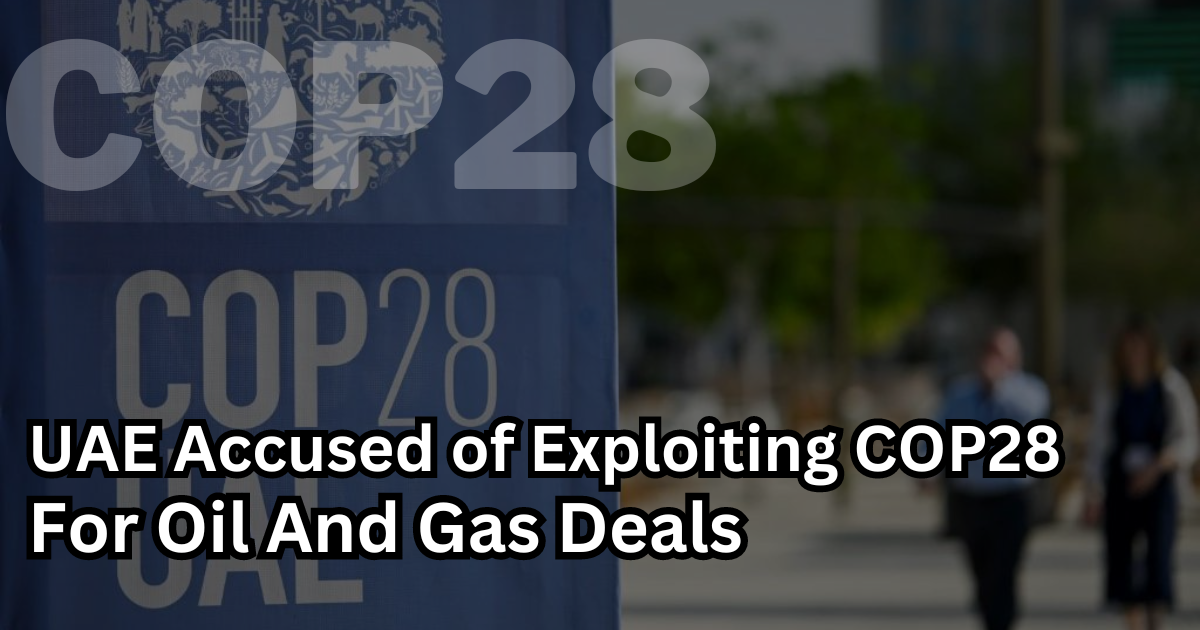In a shocking exposure, leaked briefing documents have shown the United Arab Emirates’ secret plans to leverage its role as the host of the upcoming UN climate talks, COP28, to pursue lucrative oil production and gas deals. The documents, prepared by the UAE’s COP28 team for meetings with at least 27 foreign governments, outline discussions about fossil fuel partnerships with 15 different countries. This revelation raises concerns about the true intentions behind the UAE’s hosting of a crucial climate talk, COP28, as it appears the nation is capitalizing on the global event for economic gains.
The leaked documents, obtained by independent journalists at the Centre for Climate Reporting, shed light on proposed “talking points” crafted by the UAE’s COP28 team. One such point, aimed at China, indicates that Adnoc, the UAE’s state oil company, is “willing to jointly evaluate international LNG [liquefied natural gas] opportunities” in Mozambique, Canada, and Australia. This blatant pursuit of fossil fuel interests during climate talks is sure to draw criticism from environmental activists and countries striving for actual climate action.
Furthermore, the documents reveal an unsettling strategy to approach a Colombian minister, expressing Adnoc’s readiness to support Colombia in developing its fossil fuel resources. This move contradicts the spirit of COP28, which should be centered on fostering sustainable practices and reducing dependence on fossil fuels. The UAE’s willingness to actively engage in such discussions contradicts its public commitment to climate action, leaving many questioning the nation’s sincerity in addressing the global climate crisis.
The talking points extend to 13 other countries, including Germany and Egypt, with messages implying that Adnoc seeks collaboration with their governments to develop fossil fuel projects. This approach raises eyebrows, as it appears the UAE is using its position as the host of COP28 to advance its economic agenda, potentially at the expense of meaningful climate initiatives. Critics argue that such actions undermine the integrity of the climate conference and hinder collective efforts to combat climate change.
When confronted with these revelations, the UAE team did not deny the inclusion of business talks during COP28 meetings. Their response, stating that “private meetings are private,” leaves room for speculation about the true nature of the discussions held behind closed doors. The lack of transparency regarding the content of these meetings raises concerns about the UAE’s commitment to prioritizing climate action over economic interests.
As the COP28 summit approaches, it is crucial to scrutinize the UAE’s motives and question whether the nation is genuinely dedicated to fostering global climate resilience. Some argue that the UAE’s hosting of COP28 may be more about gaining international acclaim than driving real change. The nation’s desire for fame and recognition on the global stage raises doubts about the sincerity of its climate efforts and the authenticity of its commitment to leading the charge against climate change.
In addition to the controversial business talks, unique figures paint a revealing picture of the UAE’s environmental impact. Despite being one of the world’s top oil producers, the nation’s per capita carbon emissions are among the highest globally. This stark contrast between its fossil fuel production and carbon footprint raises questions about the UAE’s dedication to reducing its environmental impact while simultaneously pursuing oil and gas deals on a global scale.
In conclusion, the leaked documents exposing the UAE’s plans to discuss fossil fuel deals during COP28 meetings cast a shadow over the nation’s role as the host of the prestigious climate conference. The questionable motives behind these discussions, coupled with the need for more transparency from the UAE team, undermine the credibility of COP28 and detract from the conference’s intended purpose of driving meaningful climate action. As the world watches, the UAE must address these concerns and clarify its commitment to genuine climate leadership, free from the influence of economic interests that run counter to the spirit of global collaboration on climate change.






